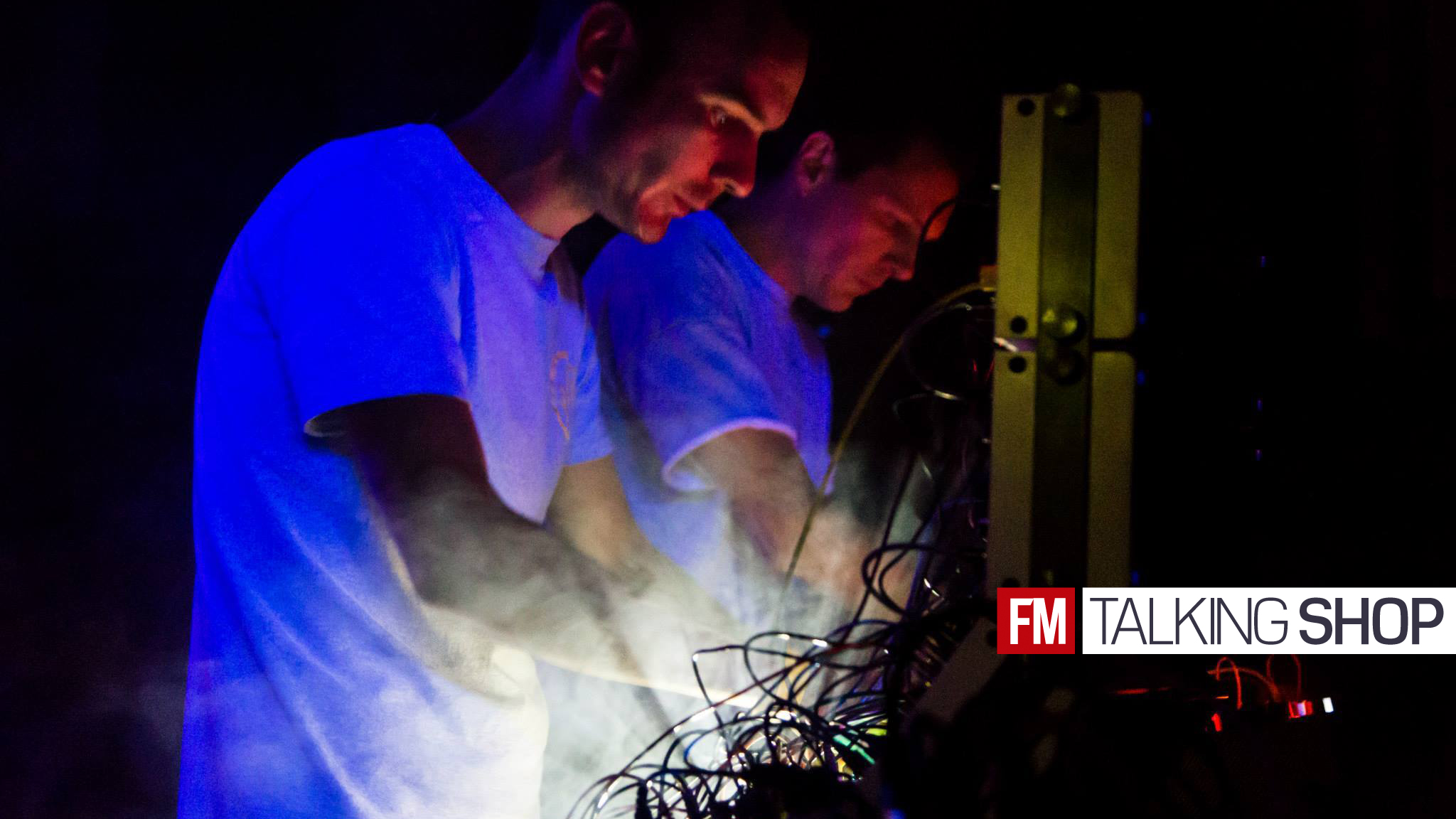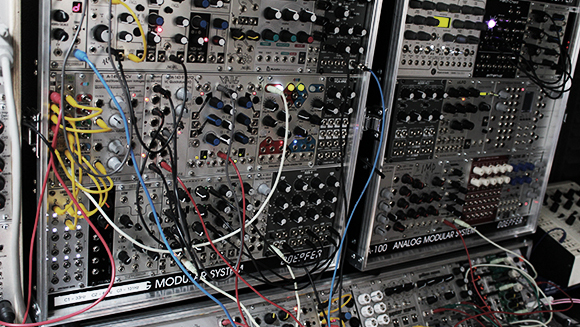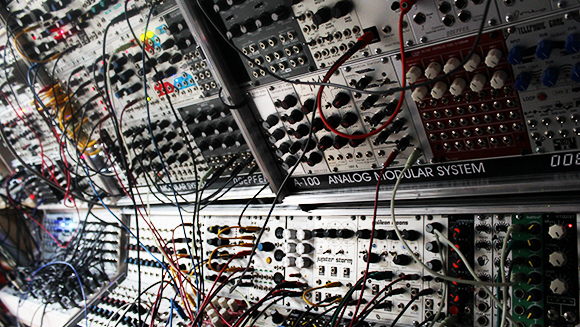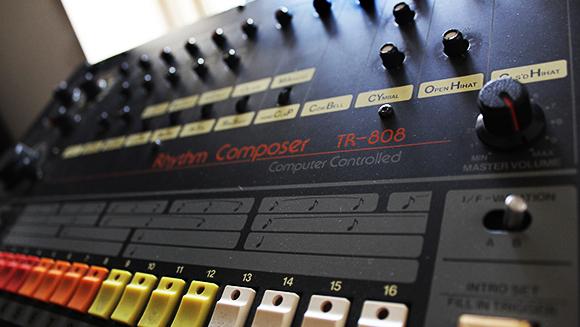Talking Shop: London Modular Alliance
The Eurorack-lovers on their hardware jams

Formed around the London Modular synth boutique, LMA are a trio of Eurorack-loving musicians whose improvisational hardware jams have garnered considerable praise on the capital’s club circuit.
The outfit’s latest release, Home Grown, is a four track EP of propulsive, synth-heavy Techno from LMA member Phil Ventre, due out on Hypercolour this month. FM caught up with Ventre to talk modular love.
When did you start making music, and how did you first get started?
“I’ve been making music for a good while. I remember always being round my mate’s house when I was 16 or so, messing about in Cubase on his Atari. My first bit of gear was probably a second hand Akai S3000 sampler. Floppy discs were all the rage back then!
“Musically I was into early Rave and Jungle. Artists like Peshay, LTJ Bukem and Randall. I had all the Yaman mixtapes, they were a huge influence on me. Production-wise it was all a bit much for me to make at the time, so I dipped my toe in to simpler grooves. It’s not something I look back on with any sense of pride, it was mostly awful stuff!”

Tell us about your studio/set-up
“Simon, Gavin and myself all have our own studios set up at home. The vast majority of what we use is hardware-based. There’s no getting away from the stuff we sell; modular obviously plays a big role in our sound. It’s great for unexpected stuff, sequences and general madness. You’d struggle with polyphony on a modular system, so we have a selection of keyboards we like to use as well.
Get the MusicRadar Newsletter
Want all the hottest music and gear news, reviews, deals, features and more, direct to your inbox? Sign up here.
“In an ideal world I’d have a dedicated, hired studio, for sure – preferably one which doesn’t have a washing machine in it. This may soon be a reality as we plan to move our store and open a number of studios close to where we are currently based.”

What DAW (or DAWs) do you use, and why did you choose it?
“I use Logic, Gavin uses Cubase, Simon uses Ableton. We are very open minded, but I am trying to convince the guys that Logic is clearly the best! They each have their merits. In the past I’ve tinkered with them all and found they do lend themselves to certain styles. Quite why or how this is I’m unsure, but I could listen back to tracks made in, say, Ableton and know pretty much straight away that it’s a track made with Ableton.
“I like the workflow in Logic. I’ve used it for years now and know it inside out. It’s more a case of feeling comfortable with what I’m using than it being better than the others. At some point I’d like to try the new MacBook touchbar to see how much this improves the experience within Logic, it does look very swish.”
What one piece of gear in your studio could you not do without, and why?
“That’s a tough one. I love my EMU Orbit, I barely use it these days but have fond memories, so it’s a keeper. The other piece would be the TR-808. No doubt this will massively divide opinions but, for me, no clone can get close enough to the original. It’s the sequencer in there that makes it, the groove and character is undeniable. We use it a lot for the music we make. Nothing can surpass that kick.”
What's the latest addition to your studio?
“We’re a dealer for DSI so their Prophet 6 was an instant no-brainer. It’s wicked and ticks so many boxes for us. The point earlier about polyphony on a modular, well, this is the answer to that! A lot of our recent music features this bad boy.
“We are big fans of French manufacturers like Mutable Instruments. Olivier Guillet there designs some superb modules. He’s always updating the firmware which changes the function dramatically to open it up into new directions. Every system should have some of his stuff. Also the Modor NF-1, which is a wildly digital synth but sounds very unique to my ears.
“The Rossum Electro-Music Morpheus module is a thing of beauty, you could play with this for hours. There’s so many others we could mention… To be honest there’s always so much new shit coming out it can be hard to keep up!”
What dream bit of gear would you love to have in you studio?
“I saw something on eBay the other day, it was an old Roland modular, I forget the model. The price was ridiculous, like $100k or something. I’d love that, not because it would necessarily add anything to our current set up, but just because it’s really old and expensive. I imagine you could almost feel the creativity surging through you just by looking at it.”
When approaching a new track or project, where do you start?
“It would probably be laying bits down at the shop and recording the audio somehow. Or sketching out some very basic jams at home on something like Native Instruments Maschine, bouncing down and sending to the other guys for some initial feedback. If it’s got legs we’d add other elements using modular and so on, crack on with that at home and then send stems out for us all to add parts to it. We each have our strengths in the process.”

What are you currently working on?
“We have the EP coming out on Hypercolour in April. Also a couple of releases lined up with Dimensions festival (they are starting a label). Something else on CPU in the next few months. Simon has some modular loops lined up for release on Tesella’s Polykicks. There’s quite a few releases floating around.
“We’re finalising details on a residency at Village Underground in Shoreditch, inviting acts down to play with us live. Other performances are dotted around including Dimensions in Croatia, which should be a really good one.
“I guess the big one for us though is our proposed move to a larger premises in Hackney Wick. This is taking up most of our time right now. I think Simon has gone slightly mad with all the planning. This will combine a larger shop space, music studios for hire and an event space for an Independent cinema that will also hold workshops, talks and live music performance.”
LMA's music making tips...
Always finish your tracks
“Even if you’re not 100% happy with the result, draw a line under it and move on to the next one. Continually tweaking restricts creativity, allows doubt to creep in and obviously slows down your workflow.”
Always save your file names appropriately
“I’ve lost count of the number of times the rendered WAV is called something totally different to the source file. Nothing is more frustrating than ploughing through scores of unnamed tracks to try and find the one you need.”
Visit London Modular
“Always buy your modular equipment from us!”


Future Music is the number one magazine for today's producers. Packed with technique and technology we'll help you make great new music. All-access artist interviews, in-depth gear reviews, essential production tutorials and much more. Every marvellous monthly edition features reliable reviews of the latest and greatest hardware and software technology and techniques, unparalleled advice, in-depth interviews, sensational free samples and so much more to improve the experience and outcome of your music-making.










